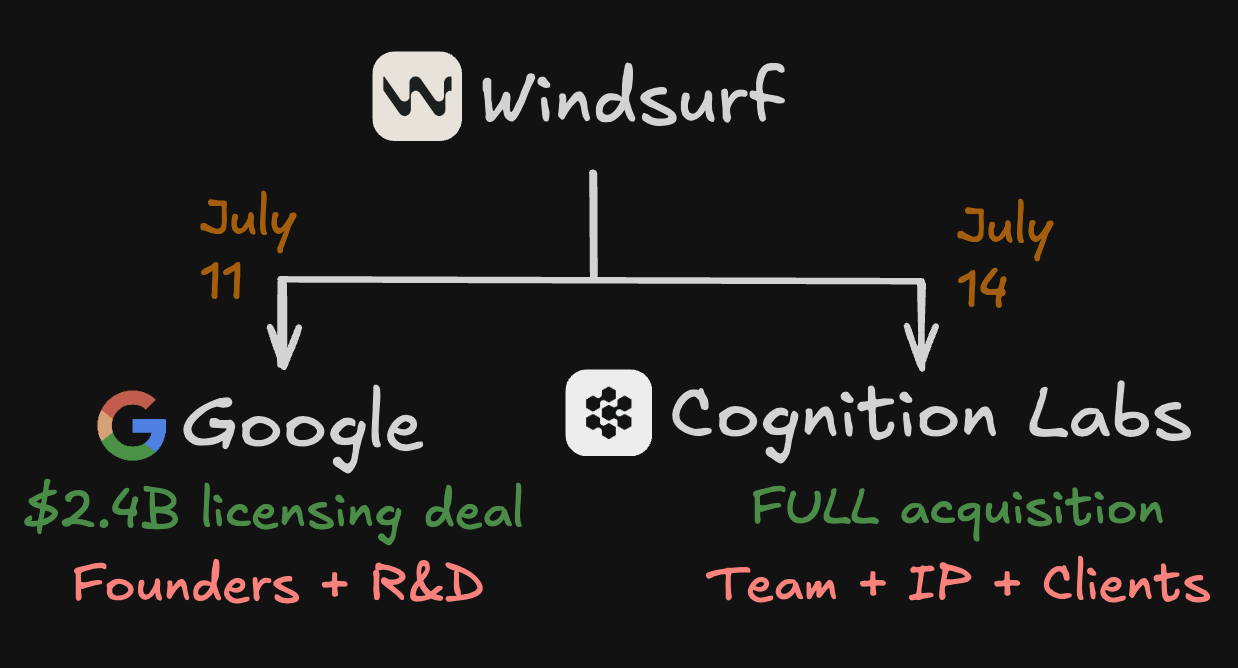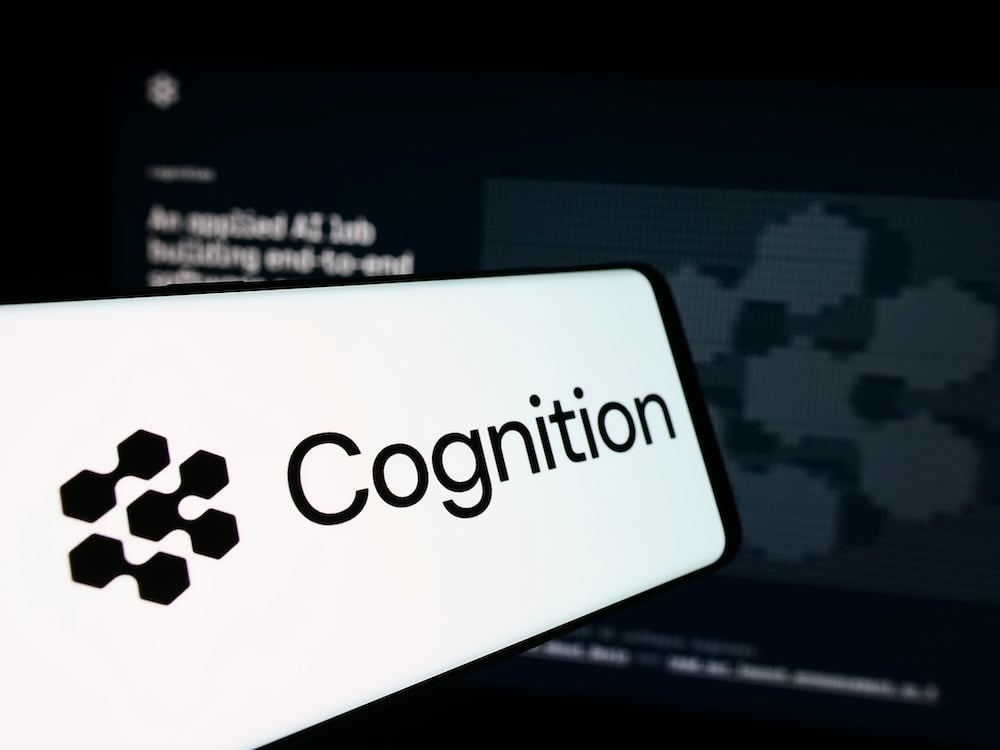On Thursday morning, Google paid $2.4 billion to hire away Windsurf’s founders. By Monday, Cognition Labs had acquired everything Google left behind. In between: 72 hours of chaos that rewrote the rules of Silicon Valley M&A.
This isn’t another story of tech acquisition; it’s a masterclass in how fast the rules of the game can change, reshaping how software is built and who builds it.

This article looks into the whirlwind that unfolded between July 11 and July 14, 2025, involving Google, Cognition Labs, and Windsurf. It’s a story of talent, technology, and market power redistributed at lightning speed, with implications for developers and the future of AI-driven coding.
Who got what in the great Windsurf dispersal
| Layer | Before July 11 | After July 14 |
|---|---|---|
| Talent |
Windsurf: ~250 employees Cognition: ~80 employees Total: ~330 people |
Google acquired:
• Varun Mohan (CEO) • Douglas Chen (Co-founder) • “Small group” of R&D staff
Cognition acquired:
• ~240+ remaining Windsurf employees • + Their own ~80 employees = ~320+ total headcount |
| Technology |
Windsurf: Agentic IDE ⚠️ Lost Claude access in June |
Google: Non-exclusive license Cognition: Full IP ownership + ✓ restored Claude |
| Market |
Windsurf: 350 enterprises $82M ARR |
Cognition: Inherits entire customer base Average contract: $234k |
Google’s surgical strike
On July 11, 2025, at exactly 10:00 AM Pacific, Google executed what industry insiders are calling a “reverse acquihire” – a surgical extraction of key talent without acquiring the company itself. For $2.4 billion, Google secured:
- The founding brain trust: CEO Varun Mohan and co-founder Douglas Chen
- Select R&D personnel: Described only as a “small group” by Google
- Non-exclusive technology license: Access to Windsurf’s coding innovations
What makes this remarkable isn’t just the price tag – it’s the precision. Google paid nearly the equivalent of OpenAI’s failed $3 billion acquisition offer, but only for a fraction of the assets. The mathematics suggests Google valued the founders and their immediate circle at an astronomical premium.
The 72-hour scramble
The numbers tell a story of a company with tremendous value suddenly left without its founding leadership:
- An $82 million ARR business continuing to operate
- 350 enterprise customers relying on the platform
- Hundreds of employees uncertain about their future
- A product that had lost access to Anthropic’s Claude models during failed OpenAI negotiations
This wasn’t sustainable. The question wasn’t whether someone would acquire the remaining assets – it was who would move fastest.
After Thursday’s Google announcement, Windsurf existed in a remarkable state of corporate limbo.
Jeff Wang, the company’s head of business who would soon become interim CEO, later described it on 𝕏 as“the wildest rollercoaster ride of my career.“
Cognition Labs swoops in
Then, come Monday July 14 at 11:00 AM PT, Cognition Labs CEO Scott Wu announced on 𝕏 what may prove to be one of the shrewdest acquisitions in AI history.
Cognition has signed a definitive agreement to acquire Windsurf.
— Cognition (@cognition_labs) July 14, 2025
The acquisition includes Windsurf’s IP, product, trademark and brand, and strong business. Above all, it includes Windsurf’s world-class people, whom we’re privileged to welcome to our team.
We are also honoring… pic.twitter.com/N2HX0Mzz65
To re-iterate, for an undisclosed sum, Cognition Labs secured:
- The entire remaining Windsurf team – with full financial participation for all employees
- Complete IP ownership – not just a license like Google
- 350 enterprise customers – averaging $234k in contract value
- Restored Anthropic partnership – Claude restored
But the real value lies in the strategic fit. To understand why, you need to know what Cognition’s fully autonomous AI software engineer called Devin is.
Devin isn’t just another coding assistant – it’s the world’s first fully autonomous AI software engineer. Unlike GitHub Copilot or even Windsurf’s current offerings, Devin operates independently with its own shell, code editor, and browser. Think of it as hiring a remote engineer who happens to be AI: you can assign tasks through Slack or Linear, review pull requests on GitHub, and get complete features built from scratch.
The combined entity promises something genuinely new: autonomous AI agents (Devin) operating within a collaborative IDE (Windsurf), creating a seamless environment where developers can fluidly move between planning, delegation, and hands-on coding.
The Combined Platform Vision

Plan
Design tasks in natural language within Windsurf’s IDE
Deploy
Launch teams of Devin agents working in parallel
Refine
Use Windsurf’s Tab and Cascade for high-leverage edits
Review
Manage PRs from AI agents within the same environment
“Imagine planning tasks in Windsurf, launching a team of Devins, and reviewing PRs from the comfort of your IDE”
— Scott Wu, CEO of Cognition Labs
The hidden economics: why the deals make sense
The math behind these moves becomes clearer when you understand the market dynamics:
For Google: The $2.4 billion wasn’t just for talent – it was a defensive play. By securing Windsurf’s founders and gaining access to their technology, Google accomplishes three things:
- Accelerates Gemini’s position in AI coding
- Denies OpenAI a key acquisition
- Potentially cuts off a revenue stream for Anthropic (by moving Windsurf users to Gemini)
For Cognition Labs: The acquisition math is even more compelling:
- 350 enterprise customers × $234k average contract = $82M ARR
- In the SaaS world, companies typically trade at 10-20x ARR
- While financial details remain undisclosed, it’s fair to assume Cognition Labs likely scooped Windsurf up at a discount given the distressed circumstances
- Plus they get the technology, team, and strategic positioning
What lies ahead
For Cognition Labs, the real work begins now. Successfully integrating two platforms, two teams, and two philosophies while maintaining momentum on both products will test the company’s execution abilities. Early signals are positive; the commitment to keeping all employees, maintaining existing products, and the clear integration vision suggest thoughtful planning.
For the broader industry, this deal highlights the ongoing consolidation in AI development tools. The combination of autonomous agents and collaborative IDEs suggests one possible direction for the market, though it remains to be seen how competitors will differentiate their offerings.
- All figures accurate as of July 14, 2025. This article will be updated if new details are disclosed.
The Takeaway
In just three days, Windsurf, one of the biggest AI coding startups, was carved up in an unusual split. Google paid $2.4 billion for just the founders and a licensing deal, while startup Cognition Labs swept up everything else: the remainder (bulk) of the team, IP, and customer base. For developers watching this space, it’s a reminder that in the AI gold rush, timing and strategy can matter more than size.

